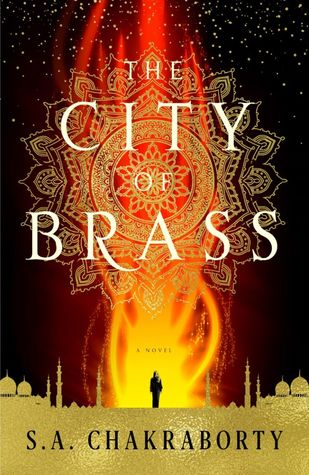 The City of Brass by S.A. Chakraborty
The City of Brass by S.A. Chakraborty Series: The Daevabad Trilogy #1
Published by Harper Voyager on November 14th 2017
Genres: Fantasy
Pages: 528
Format: eARC
Source: Publisher





Meet Nahri, a young hustler who makes a living scamming the superstitious and gullible on the streets of 18th century Cairo. Even though she has the uncanny ability to sense illness in a person simply by touching them, she’s never truly believed that what she does is magic. But then one day during a zar ceremony, in which Nahri was just supposed to go through the motions, she accidentally calls forth a daeva warrior. But said daeva isn’t just any spirit to be summoned, for he is Dara, the greatest warrior to have ever lived. Right away, he recognizes Nahri for what she really is—something not all entirely human—and soon the two of them are on the run, trying to say one step ahead of the dark forces pursuing them. Their only safe haven would be Daevabad, the city of gilded brass walls and enchantments, where Dara claims there will be protection to be found.
Many authors have endeavored to tell a similar story, most of which always seem to feature a girl and a guy attempting to reach a magical city while evading the evil creatures hunting them. However, S.A. Chakraborty has achieved something quite unique and remarkable with City of Brass, incorporating elements from Middle Eastern folklore (the book’s title itself is named after a story of the same name from One Thousand and One Nights) along with a heady infusion of magic combined with the rich history and culture of the time period.
There’s also a whole other side to this tale featuring Prince Alizayd, the rather idealistic and sheltered younger son of the current king of Daevabad. His city is one divided along racial lines, those with human blood being largely oppressed and marginalized in a kingdom dominated by the djinn. Although he’ll never inherit the throne, Ali still wants to do some good for the shafits, or mixed bloods, even if it means going against his family’s wishes and jeopardizing his father’s reign. As whispers of rebellion threaten to further destabilize the peace and Daevabad’s politics, certain insurgency groups see Ali’s sympathies towards them as a possibility that he can be convinced to join their cause.
Expertly balancing Nahri and Ali’s narratives, Chakraborty takes us on a journey through a vivid alternate world, exploring the themes of political intrigue and human ambitions against a backdrop of religious and cultural tensions. The world-building is richly detailed, created with what must have been hours of meticulous research. History is smoothly blended with magic and mythology, integrating readers into an immersive experience.
However, if I had to name one thing I loved most about the book, it would be the writing. Chakraborty’s style is elegant and descriptive without bogging down the prose with unnecessary embellishment, so the result is a natural sounding narrative that is so easy to get into. Also, the characters’ voices and dialogue sounded natural without coming off as anachronistic—which may seem like a trivial matter, but this was actually key in helping me connect with the main protagonists. I found myself immediately drawn to Nahri, for example, even when she was immediately revealed to be a thief and con artist, performing fake palm readings and healings. Things only got more interesting when Dara entered the picture. Gradually, the daeva’s initial brusque demeanor is softened through the revealing of his intriguing backstory, not to mention his interactions with Nahri, which are sometimes shot through with moments of lightness and humor. Although I’d fully expected a romance, what impressed me was the organic way the feelings grew between the two characters and how natural they felt. None of that insta-love nonsense.
And then there’s Prince Ali, a djinn raised in the shadow of his older brother Muntadhir, heir to the throne. His innocence and naiveté notwithstanding, I just love what a good, kind, and compassionate person he is. Still, what happens when loyalty to family clashes with the need to do what’s right? Life is complicated, even when you are a prince. The author paints an intricate picture of what it’s like in Daevabad, where awful injustices are committed every day against shafits—and the crown does nothing about it. Ali, who is perhaps more religious than the rest of his family, is troubled by how this cruel treatment of mixed-bloods goes against the teachings of his god, and yet he also loves his brother, whom he has pledged to serve when Muntadhir becomes king. By exploring the great personal and political implications on both sides of Ali’s dilemma, Chakraborty actually managed to make his POV the more compelling storyline in the second half of the novel.
Speaking of which, there were some hitches in the pacing and unevenness in the storytelling, but overall I have to say The City of Brass was exceptionally polished for a debut. I was pleasantly surprised at how much I enjoyed it! I was excited to learn that the sequel already has a title—The Kingdom of Copper—and that is already in the works. I’ll definitely be looking out for it next year.
- Review: The Poppy War by R.F. Kuang - May 7, 2018
- Review: Glimpse by Jonathan Maberry - April 23, 2018
- Review: One Way by S.J. Morden - April 9, 2018


2 Comments
Great review, Stephenie! About the rating, though: You gave it 4 out of 5 stars, but the color-coded rating only shows it at 4 out of 10. That should really be 8 out of 10, right?
Ooh, thanks for the catch! I’m still occasionally getting mixed up by the two-tier star and number rating system on this site 😀